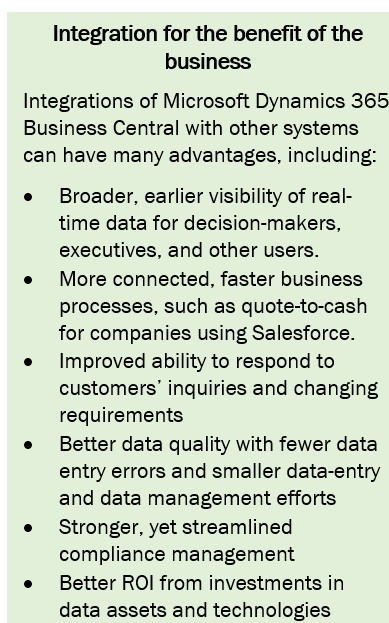For many businesses, integrating Microsoft Dynamics 365 Business Central with their other software systems is the most effective step they can take to realize the benefits of their technologies. Sikich treats integration as a strategic, high-value undertaking that can help companies realize transformative initiatives and business goals faster. Below, we share an overview of how we accomplish integrations with Business Central.
Fulfilling the promise of ERP
For many growing, midsize or smaller businesses, Microsoft Dynamics 365 Business Central is the perfect onramp to the modern cloud and their first adoption of a business management solution that can connect finance, operations, sales, and service teams and processes to enable greater agility in achieving their objectives. For some companies, Business Central provides a natural upgrade path from older ERP software like Microsoft Dynamics NAV and Microsoft Dynamics GP.

When organizations adopt Business Central, they typically replace disparate legacy software tools and transition to a more holistic way of managing the business. However, they often also continue using some specialized or best-of-breed software that meets specific requirements in their business. That gives them an opportunity to consider integrating their Dynamics ERP and other software systems. Integrations can certainly help companies experience the full benefits of their software as they unleash data flows and streamline IT management. Even more than that, they can support transformative business initiatives and help decision-makers guide the organization toward its goals.
Strategic ERP integration performed by experts
Sikich consultants help clients evaluate, deploy, and run Business Central. Before we delve into a software project, we work with you to optimize your roles and processes to address any roadblocks that could get in the way of your transformational goals or your organization’s productivity and efficiency. As we learn about our existing technology environment and the software systems you plan to continue using, we discuss and explore integration opportunities in the context of the business outcomes you want to achieve from technology.
When Sikich performs one-time or serial integrations of Business Central with your other software, we draw on our industry, process, and technical expertise and the understanding of your processes and goals we’ve gained during the initial Business Central deployment and our fact-finding. You have accountability from a single Sikich project manager, and you don’t need to involve a systems integrator. We know how to resolve technical issues with other software providers in a friction-free manner.
If Sikich didn’t implement your Business Central on-premises or in the cloud, but you want to work with us to accomplish integrations, we will happily do so. From time to time, we also replace third-party Business Central integrations that are not as stable and robust as clients would like.
Aligning integrations with business goals
In our integration practice, data mapping is one of the most critical steps to ensure that a project meets business requirements. Data mapping allows us to incorporate requests from business stakeholders for the data flows and information available in their processes. As the work is about to start, our consultants prioritize and plan integrations to happen efficiently and with minimal disruption for your technology users.
In recent projects, we have integrated Business Central with such widely used software systems as Salesforce, Shopify, WooCommerce, and BigCommerce, as well as quality control, logistics, warehouse, and specialized manufacturing software. Some of our newest Business Central integration clients include:
- Professional services firm integrated their ERP with Salesforce Sales Cloud
- Large retail chain where ERP integrates with point-of-sale and compliance reporting software
- Distributor integrated planning, forecasting, and warehousing systems with Business Central
- Specialty retailer that connected its eCommerce, CRM, and ERP systems
Making best use of Microsoft tools and Sikich expertise
Business Central is key to our business. Sikich was one of the first Microsoft partners to include Business Central in the digital transformation strategies we help clients develop, and the first to deploy several of the solution’s versions in North America. Sikich consultants are experts in using Microsoft Azure DevOps for managing the software implementation lifecycle, including design, development, testing, and deployment. As soon as Microsoft made it possible to integrate Business Central with other software, we began working with clients to take advantage of this opportunity.
When we create Business Central integrations, we use the full arsenal of Microsoft tools, including Azure Integration Services with Azure Logic Apps, Azure API Management, Azure Service Bus, and more. We also developed our own Sikich Integration Manager, which reflects expertise from many successful projects and comes with prebuilt code and database objects that can make integrations robust and efficient. As we rely as much as possible on proven, standardized technology, clients do not need to invest in and wait for the completion of custom development projects to facilitate their Business Central integrations.
Scalable, manageable, and robust
When we create integrations, we stay away from hard-coded integrations in the ERP system. Using our Integration Manager and the Microsoft Azure tools, we safeguard the integrity of the source code by building external, “abstracted” connections between system APIs instead of direct, point-to-point integrations. That approach allows us to keep integrations scalable and manageable. If the numbers of users, transactions, products, or your data volumes increase, your Business Central integrations will keep up with the greater workloads. This also makes it easier to sever an integration or add new systems to an enterprise ecosystem.
Because we don’t hard-code integrations inside ERP, they will remain intact when you upgrade Business Central or the other software systems. You are not locked into certain versions of your software tools. That also applies to the predecessor of Business Central: you can transition from Dynamics NAV to Business Central without breaking any integrations between NAV and other software.
Here to help
No matter whether Sikich implemented Business Central for you or not, we’re available to connect it with your other important software tools. At the end of our effort, your IT staff or Sikich managed services team can handle the minimal day-to-day integration management.
To connect with us or find out more:
- Contact the Sikich team.
- Visit our Business Central page.
- Read about Business Central and Salesforce integration.
This publication contains general information only and Sikich is not, by means of this publication, rendering accounting, business, financial, investment, legal, tax, or any other professional advice or services. This publication is not a substitute for such professional advice or services, nor should you use it as a basis for any decision, action or omission that may affect you or your business. Before making any decision, taking any action or omitting an action that may affect you or your business, you should consult a qualified professional advisor. In addition, this publication may contain certain content generated by an artificial intelligence (AI) language model. You acknowledge that Sikich shall not be responsible for any loss sustained by you or any person who relies on this publication.









